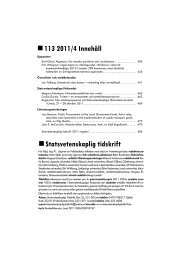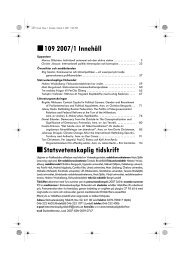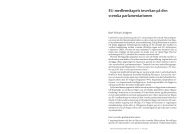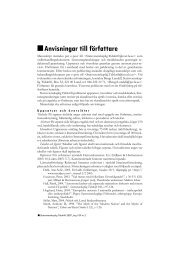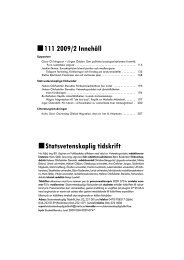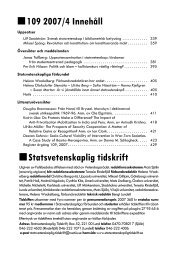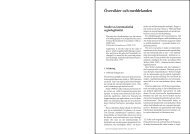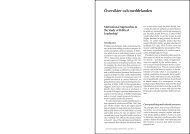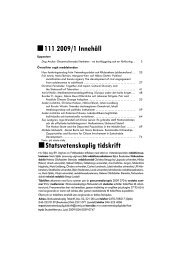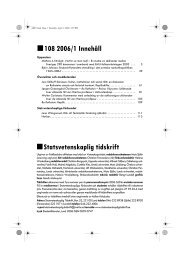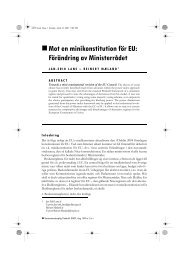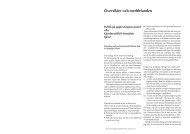Helt nummer 2012/3 (PDF, 1387 kb) - Statsvetenskaplig tidskrift
Helt nummer 2012/3 (PDF, 1387 kb) - Statsvetenskaplig tidskrift
Helt nummer 2012/3 (PDF, 1387 kb) - Statsvetenskaplig tidskrift
Create successful ePaper yourself
Turn your PDF publications into a flip-book with our unique Google optimized e-Paper software.
Litteraturgranskningar<br />
Litteraturredaktör: Rickard Andersson<br />
Söderström, Johanna, 2011. Politics<br />
of Affection: Ex-Combatants, Political<br />
Engagement and Reintegration<br />
Programs in Liberia. Uppsala: Acta<br />
Universitatis Upsaliensis, Uppsala<br />
universitet.<br />
Anmälan av Terrence Lyons<br />
One of the great challenges of post-conflict<br />
peacebuilding is to encourage ex-combat-<br />
ants to demobilize, reintegrate, and engage<br />
constructively in civilian politics. Johanna<br />
Söderström’s doctoral dissertation, Politics of<br />
Affection: Ex-Combatants, Political Engage-<br />
ment and Reintegration Programs in Liberia,<br />
provides an empirically rich and penetrat-<br />
ing investigation of these essential issues. The<br />
study builds upon the literature on demobi-<br />
lization and reintegration and the transfor-<br />
mation of militias into political parties but<br />
shifts the focus from the leadership and the<br />
larger organization to the individual ex-com-<br />
batant. ”Political reintegration”, she argues,<br />
”is a process whereby political channels are<br />
increasingly seen as viable for handling soci-<br />
etal problems for the individual ex-combat-<br />
ant” (p 59).<br />
Processes of disarmament, demobiliza-<br />
tion, and reintegration (DDR) have been stud-<br />
ied extensively as mechanisms to reduce the<br />
likelihood of a return to war. DDR, however,<br />
may also be an ”important political space<br />
where political orientations and identities can<br />
be molded, and networks may be created” (p<br />
21). In order to understand the relationships<br />
between reintegration and politics, DDR<br />
should be disaggregated so that the micro-<br />
processes of social, economic, and political<br />
reintegration can be analyzed separately and<br />
without presumptions that each necessar-<br />
ily reinforces the others. Finally, DDR offers<br />
<strong>Statsvetenskaplig</strong> <strong>tidskrift</strong> · Årgång 114 · <strong>2012</strong> / 3<br />
particularly important processes for shap-<br />
ing post-conflict state-society relationships.<br />
Söderström argues, ”In the context of a weak<br />
state, DDR can provide an unusual oppor-<br />
tunity for state-citizen interaction, and the<br />
potential impact is larger in this situation as<br />
compared to the context of big government<br />
where individuals encounter many and vary-<br />
ing policies and programs” (p 43).<br />
Söderström investigates two mechanisms<br />
that link reintegration programs with ex-<br />
combatants’ political engagement. The first<br />
is an access mechanism, whereby providing<br />
ex-combatants with more socio-economic<br />
resources will have a positive impact on an<br />
individual’s political engagement. Secondly,<br />
political engagement is encouraged through<br />
an interpretative mechanism and procedural<br />
effects as the methods employed in reintegra-<br />
tion programs shape ex-combatants’ norms<br />
and expectations. She is careful not to sug-<br />
gest that all political engagement will sup-<br />
port democracy but that ex-combatants may<br />
be engaged politically through neo-patrimo-<br />
nial or authoritarian processes and structures.<br />
One of this study’s central puzzles is to under-<br />
stand and evaluate ex-combatants’ hesitations<br />
concerning active political participation and<br />
open public debate. Her nuanced case study<br />
teases out some of the tensions between the<br />
ideals of free speech and the right to dissent,<br />
on the one hand, and the imperatives of polit-<br />
ical order and consensus in a war-torn society<br />
such as Liberia on the other.<br />
In order to collect data on ex-combatant<br />
attitudes in Liberia, Söderström used focus<br />
groups. This is a less common methodology<br />
than surveys or individual interviews but<br />
Söderström makes her case for the advantages<br />
of focus groups and is explicit about their lim-<br />
itations as well. Her research focused on five<br />
different Liberian reintegration programs, as



